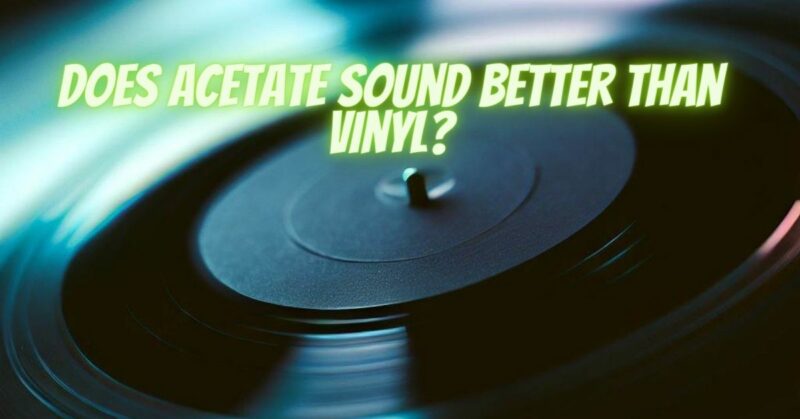The world of analog music is rich with formats that captivate audiophiles and collectors, and two formats that often spark debates are acetate and vinyl records. The question that arises is whether acetate truly sounds better than vinyl. In this article, we’ll dive into the nuances of acetate and vinyl sound quality, exploring the factors that influence their sonic characteristics and helping you understand whether one format genuinely offers superior audio quality over the other.
Acetate Sound Quality:
1. Direct-Cut Process: Acetate records are created through a direct-cutting process, capturing the audio signal directly from the mastering console. This can result in a more unfiltered and immediate sound compared to vinyl.
2. Raw Authenticity: Acetate’s lack of a protective layer allows it to capture nuances, imperfections, and high-frequency details that might be lost during mass vinyl production.
3. Imperfections and Charms: The direct-cutting process can also capture imperfections and artifacts that contribute to a unique and authentic sonic character.
Vinyl Sound Quality:
1. Warmth and Character: Vinyl records are known for their warm, analog sound that many listeners find appealing, contributing to a nostalgic and immersive listening experience.
2. Mastering and Pressing: The quality of the mastering, pressing, and playback equipment can greatly impact the sound quality of vinyl records.
3. Durability: Vinyl’s sturdier composition and protective outer layer often result in a more durable format that maintains consistent sound quality over repeated plays.
Factors Influencing Sound Quality:
1. Mastering Quality: The quality of the original master recording, regardless of format, plays a pivotal role in the final sound quality.
2. Playback Equipment: The quality of your playback equipment, including turntables, cartridges, and speakers, greatly influences the sound you perceive.
3. Listener Preferences: Sound quality is subjective, and personal preferences for warmth, clarity, and immediacy play a significant role in determining which format is preferred.
Collectibility and Rarity:
1. Acetate Records: Acetate records are often limited in production, making them collector’s items with historical and sonic significance.
2. Vinyl Records: Vinyl records encompass a wide range of releases and can hold value based on rarity, special editions, and artist reputation.
The debate over whether acetate sounds better than vinyl is complex and subjective. Acetate records offer a raw and immediate sound that captures nuances and imperfections, providing a unique authenticity. Vinyl records, known for their warmth and charm, deliver a nostalgic experience that resonates with many listeners. The perception of better sound quality varies from person to person, as it’s influenced by individual preferences, equipment quality, and the recording’s inherent characteristics. Ultimately, both acetate and vinyl formats contribute to the rich tapestry of analog music appreciation, offering distinctive and immersive ways to experience the art of sound.


